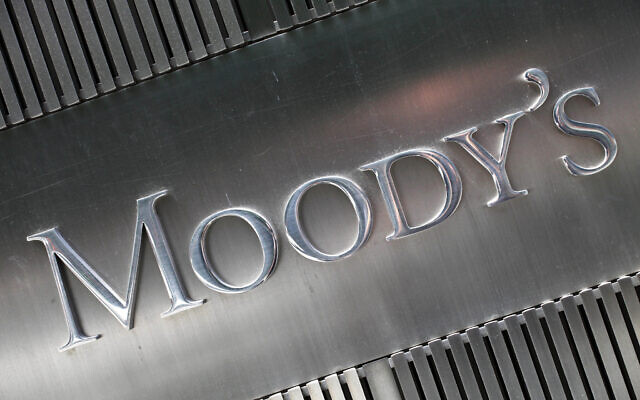Dismissing Moody’s downgrade, Smotrich says any economic damage is fault of protests
Outgoing securities chief: ‘Ignoring risks undermines confidence in Israeli market’; economist warns: Israel set to be on investors’ and credit rating agencies’ ‘watch list’
Sharon Wrobel is a tech reporter for The Times of Israel.
Moody’s Investors Service’s downgrade of Israel’s credit rating outlook was highly anticipated by financial markets, but the ramifications of the move are slated to haunt the economy for some time.
Late on Friday, Moody’s lowered the country’s economic outlook from positive to stable, citing a “deterioration of Israel’s governance” and criticizing the “manner in which the government has attempted to implement a wide-ranging [judicial] reform without seeking broad consensus.” This, the agency warned, “points to a weakening of institutional strength and policy predictability.”
“That Israel’s positive outlook is not intact was not a surprise but more importantly what is coming out of the Moody’s report is that the agency has discovered Israeli institutions as a weak point, which previously wasn’t an issue in their assessment of the country’s credit risk,” Rafi Gozlan, chief economist at IBI investment house, told The Times of Israel. “It is this confidence or trust that now needs to be built from scratch with credit rating agencies and investors, and that will take time and is likely to put Israel on a watch list for longer.”
Moody’s reaffirmed Israel’s A1 credit rating backed by “strong economic growth and improving fiscal strength,” while warning that the rating “would come under downward pressure if the current tensions were to turn into a prolonged political and social crisis with material negative impact on the economy, possibly linked to substantially lower capital inflows into the important high-tech sector and relocation of Israeli firms abroad.”
The vaunted tech sector has long been touted as the main engine of Israel’s economic growth, accounting for 49% of total exports and generating around 15% of GDP in 2022.
In April last year, Moody’s upgraded Israel’s economic outlook from stable to positive, affirming the country’s credit rating as A1. Before that, the country had earned a positive outlook from Moody’s in July 2018, which was lowered to stable in April 2020 when the COVID-19 pandemic started gaining pace.
Speaking at the Knesset Finance Committee on Sunday, Finance Minister Bezalel Smotrich said he took Moody’s report “seriously,” but he sought to downplay the downgrade as “no big drama.”
“I don’t think economists are great experts in constitutional, judicial law; they don’t hold a doctorate on governmental structure in Israel,” Smotrich said in remarks aired on the Knesset channel. “The responsibility of Israel’s economy lies on my shoulders, not on Moody’s shoulders, nor on the shoulders of the economists or on the professionals.”
Smotrich reiterated that the planned judicial changes will be good for the economy and any damage would be a result of the “campaigns” against the reform.
Former Bank of Israel chair Jacob Frenkel retorted: “If we call this ‘no big drama,’ and merely unpleasant, it will turn into a giant drama… We’re being given a warning. They’re telling us, People, you’re heading in a bad direction.”
Other top Israeli economists and businesspeople on Sunday slammed the government over its controversial judicial overhaul plans and urged the coalition “to shelve its failed [overhaul] plan” and “come back to reality,” while calling the government’s response to Moody’s update “extremely worrying and disconnected from reality.”
Anat Guetta, outgoing chairwoman of the Israel Securities Authority, said in a statement marking the end of her term that the national economy was in “a concerning period” and facing “substantial risks.” She also called the downgrade by Moody’s a “warning sign.”
“Ignoring the potential risks… undermines confidence in the Israeli market. Government decision-makers must take bold action whose purpose is to restore confidence and stability in the economy,” Guetta said.
In a joint statement, Prime Minister Benjamin Netanyahu and Smotrich said Saturday that the credit ratings agency’s analysts “correctly recognize the strength of the Israeli economy,” framing the concerns raised about “Israel’s political and economic stability” as “natural for those who do not know the strength of Israeli society.”
In the runup to the Moody’s update, the shekel has over the past week weakened 3.2% against a basket of major global currencies, trading around its lowest level since October 2020 as US stock indexes nabbed weekly gains. Historically, the shekel’s performance is characterized by a close correlation with US markets.

On Sunday, the Tel Aviv Stock Exchange’s benchmark TA-125 index slipped 0.4% and the TA-35 index of blue-chip companies declined 0.3%, while the TA-90 index was down 0.5%. The shekel, which doesn’t trade on Sunday, fell 0.8% to 3.67 against the US dollar on Friday before the Moody’s update.
“Israel’s credit outlook downgrade was already priced in by financial markets even before it was published,” said Alex Zabezhinsky, chief economist at Meitav investment house. “The markets are now expressing concern about the worsening of the economic situation even if the judicial reform is not promoted.”
Since the beginning of the year as the turmoil and social unrest over the judicial plans intensified, the TA-125 index dropped more than 4% and the TA-35 index of blue-chip companies lost more than 3.2%. The TA-90 index slumped almost 8%.
Looking ahead, the credit ratings agency acknowledged recent efforts by the government to put the legislative process of the judicial overhaul on hold in order to reach a compromise with opposition parties, but cautioned that it is “far from clear whether a compromise can be found.”
“The government has reiterated its intention to change the selection process for judges, implying that the risk of renewed protests remains high,” Moody’s pointed out in the report. “All in all, the recent events offset the positive developments that had led Moody’s to assign a positive outlook in April 2022, which related to strong economic and fiscal performance and the implementation of structural reforms by the previous government.”
Bank Hapoalim chief strategist Modi Shafrir said he expects Israel’s long-term risk premium to increase following Friday’s credit outlook downgrade and raised the possibility that international rating agency Standard & Poor’s (S&P) will follow in the footsteps of Moody’s and revise the country’s outlook at the upcoming update scheduled for May 12. Shafrir cited a deterioration in the Israeli internal political conflict and concern over an escalation of the geopolitical situation as additional risk factors.
In May last year, S&P kept Israel’s favorable rating unchanged at AA- with a stable outlook, noting the country’s positive fiscal performance and a strong tech sector, which make up its resilient economy. In early March, Fitch Ratings reaffirmed Israel’s A+ credit rating with a stable outlook, citing the country’s “diversified, resilient” economy, while warning that the government’s planned judicial changes could have a “negative impact” on the country’s credit profile.
In a scenario in which the judicial overhaul talks between coalition and opposition parties break down, Shafrir sees the shekel depreciating further to 3.80 against the US dollar and even weaker levels. Should the negotiations brokered by President Isaac Herzog lead to a compromise and broad agreement on the judicial overhaul and the internal rift, the shekel could strengthen back to 3.45 against the greenback, according to Shafrir’s estimates.
Moody’s expects the pace of economic growth in Israel to slow to around 2.6% this year from the 6.5% growth in 2022. For now, the credit rating agency forecasts GDP growth of around 3.5% in 2024.
“While a prolongation of the current events poses significant risks to the outlook for Israel’s economy, there is so far no indication of material capital outflows or a reconsideration of investments from abroad in Israeli high-tech companies,” Moody’s wrote in Friday’s report.











